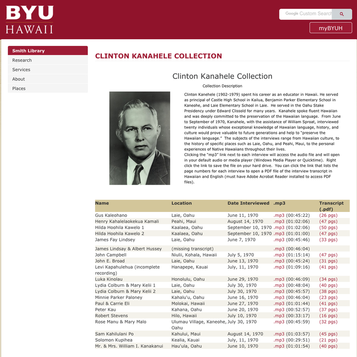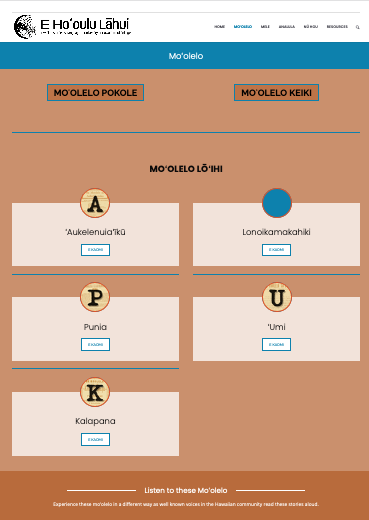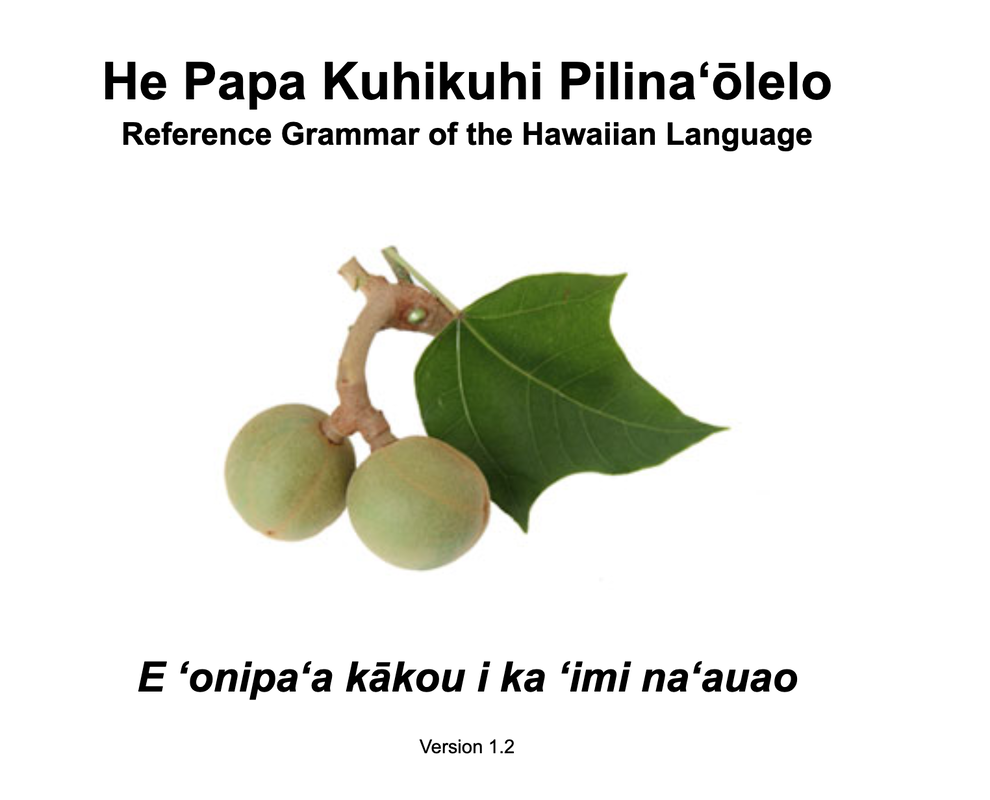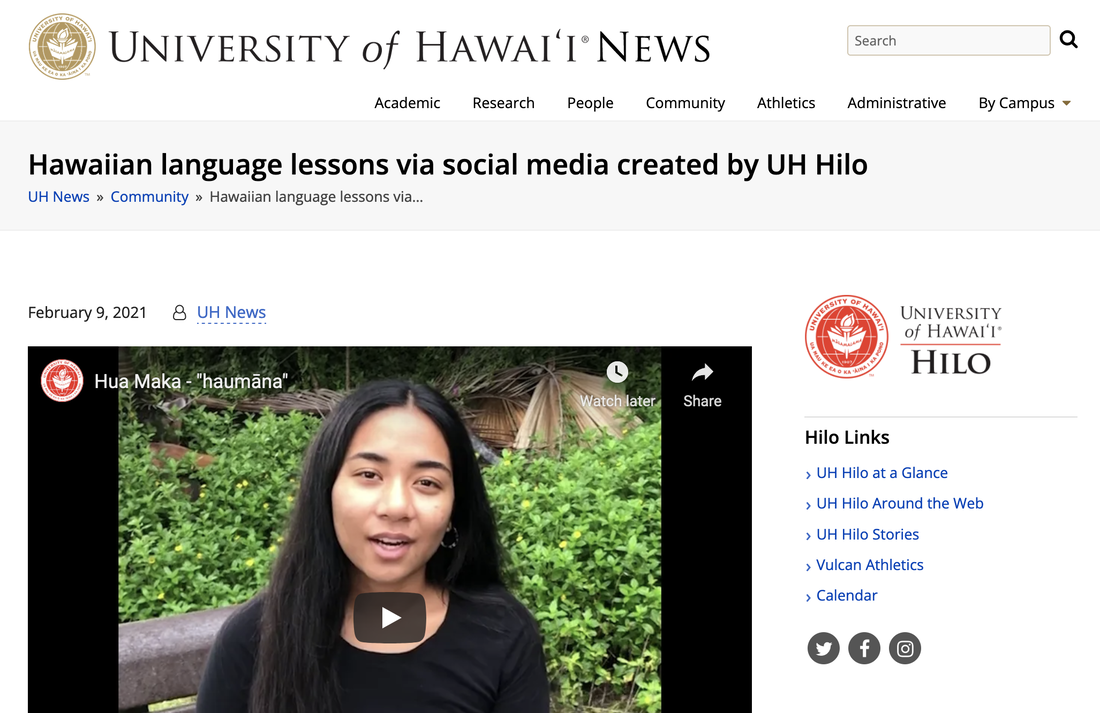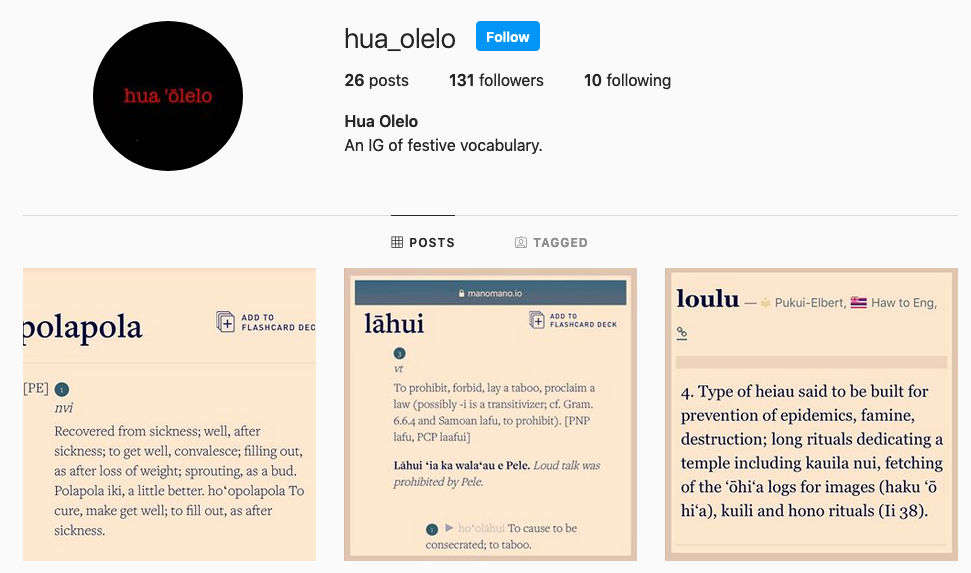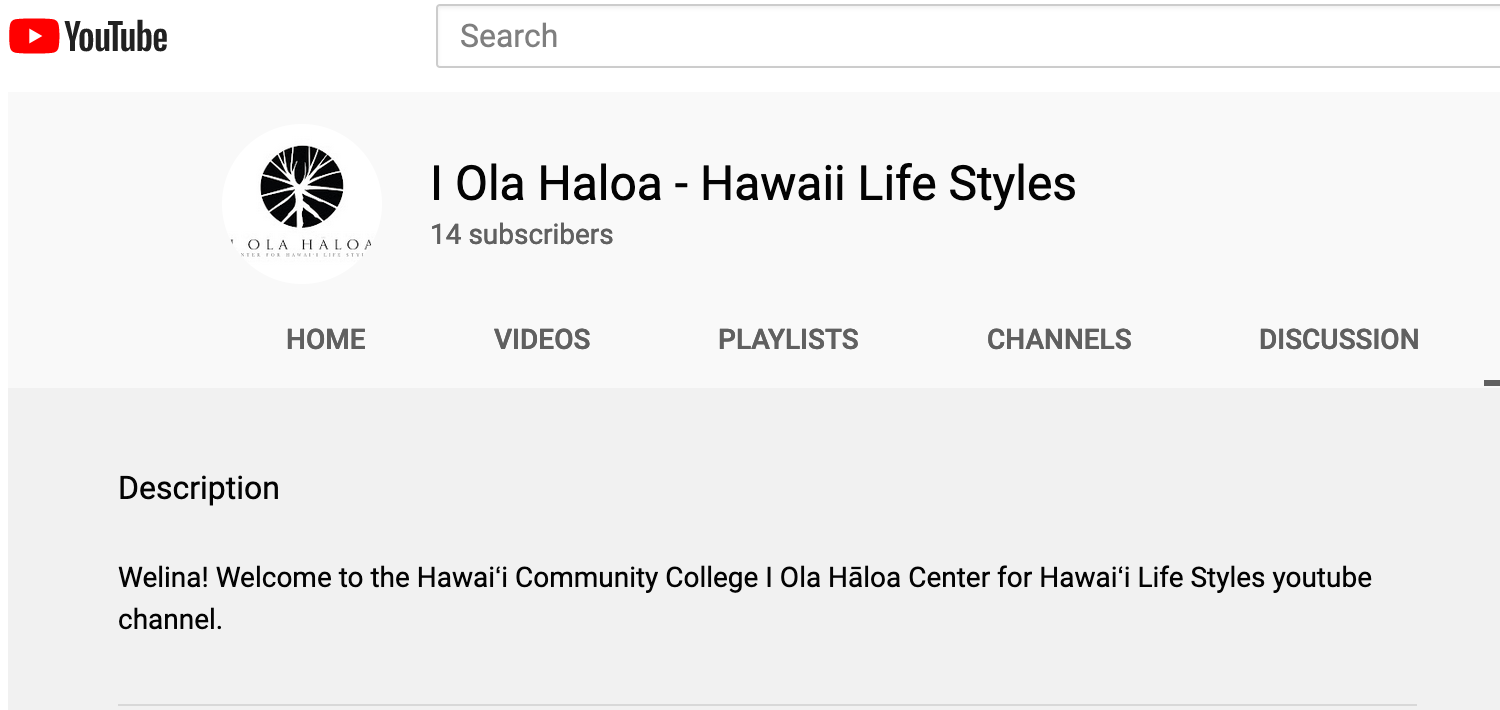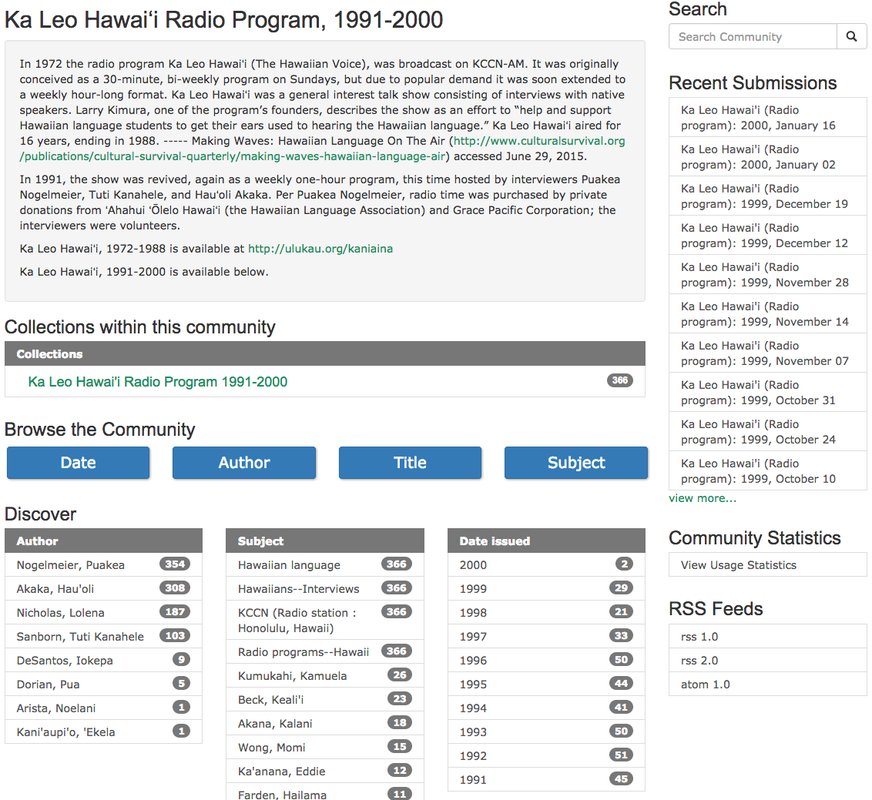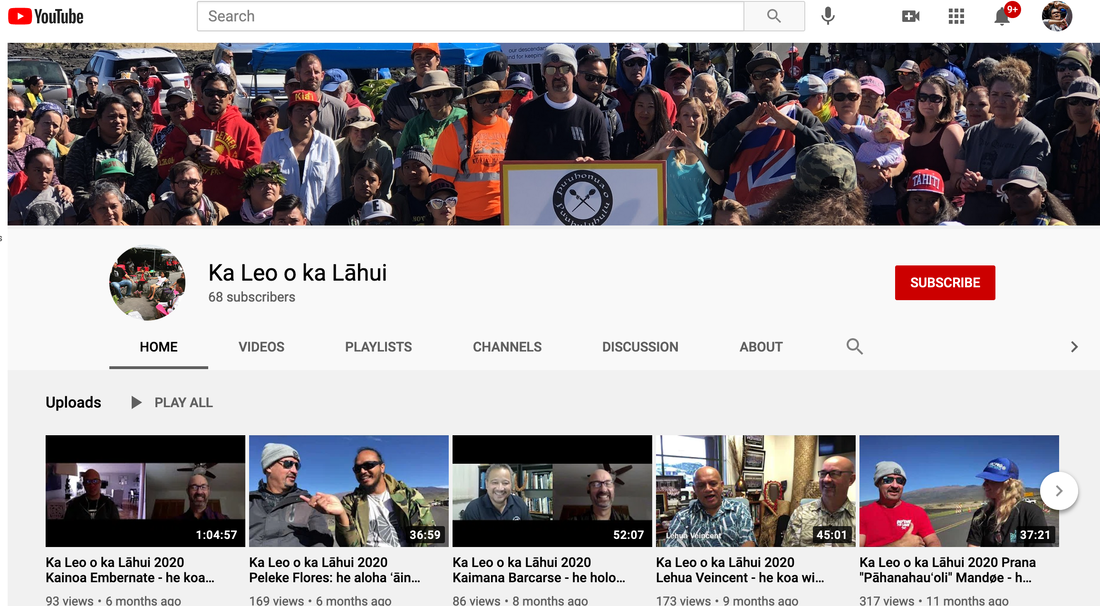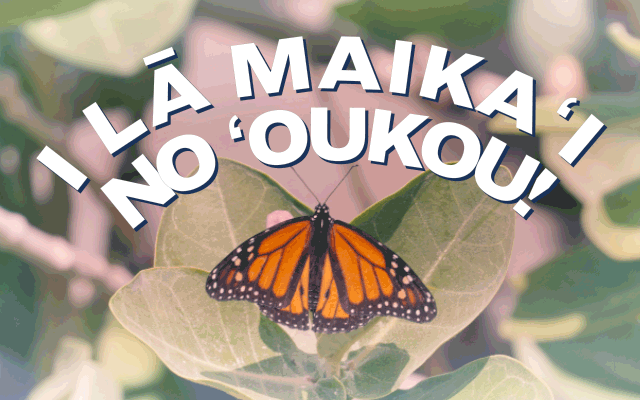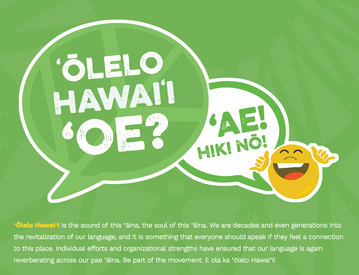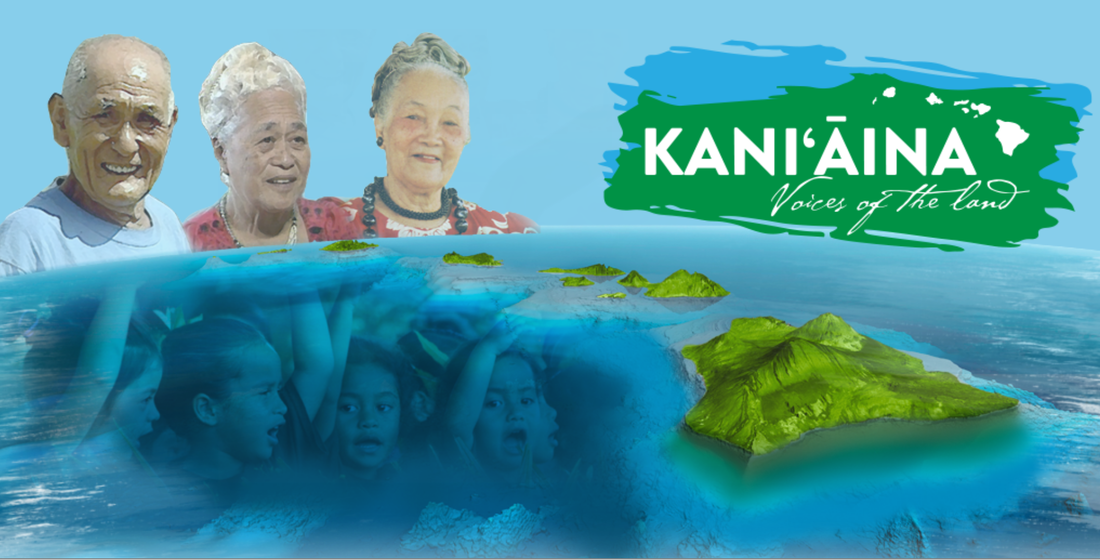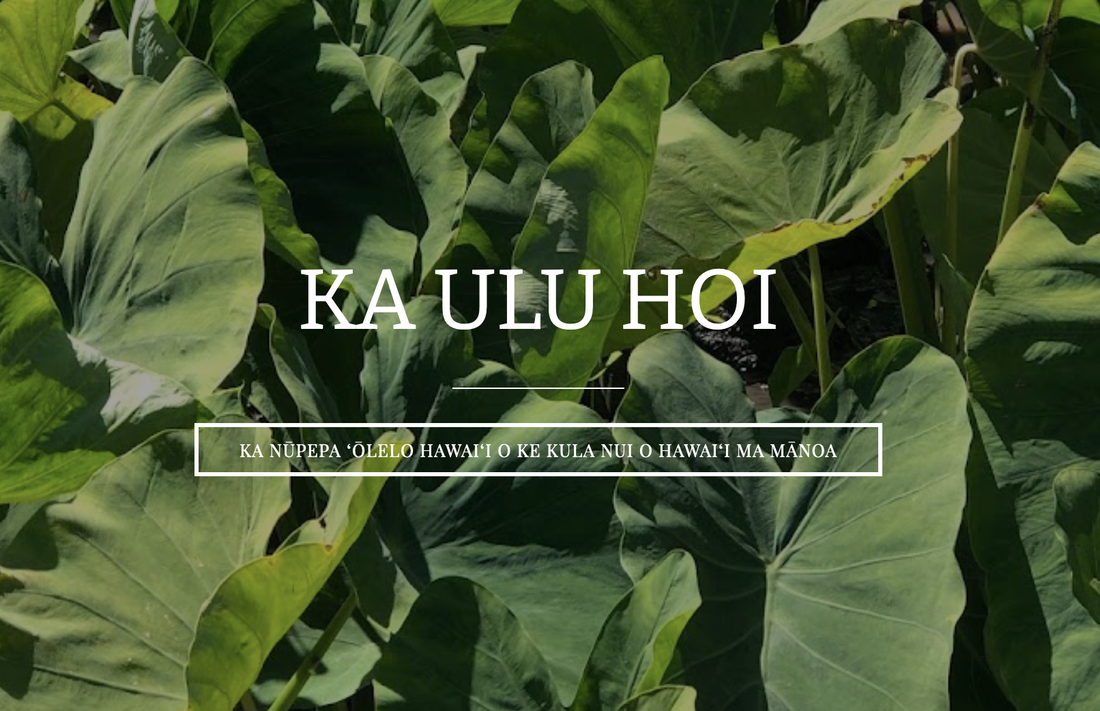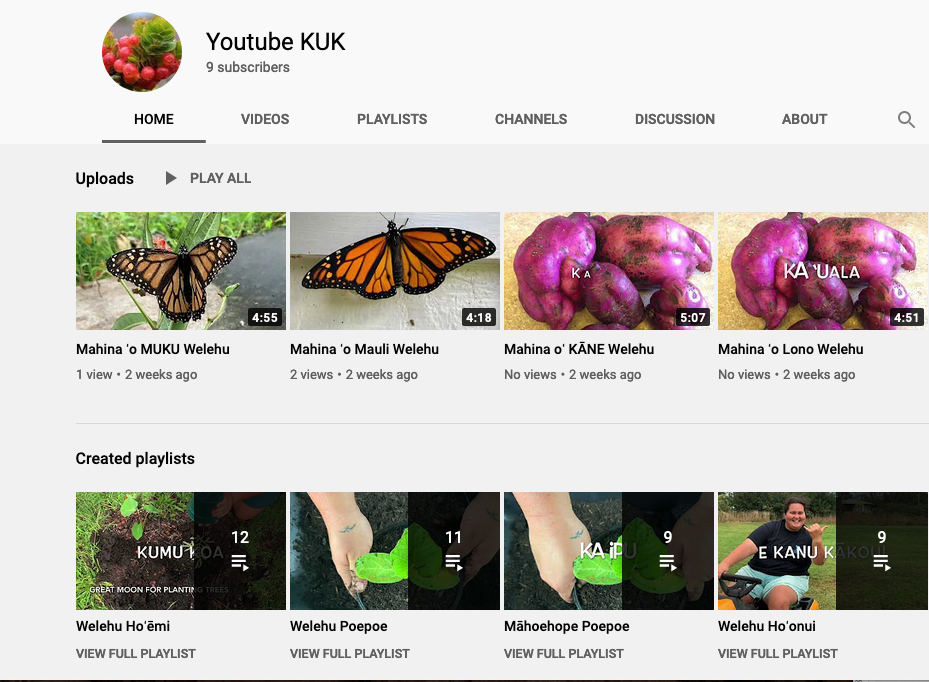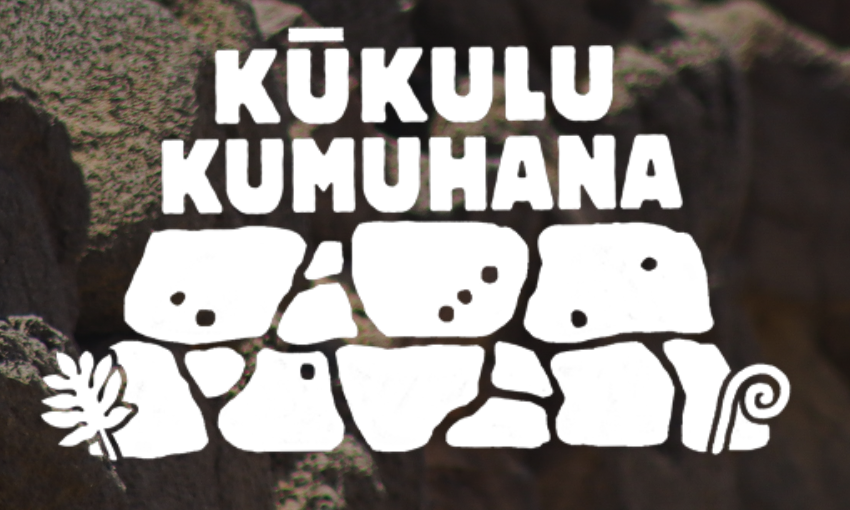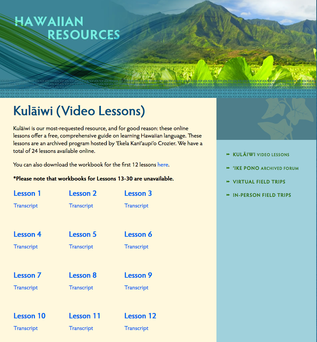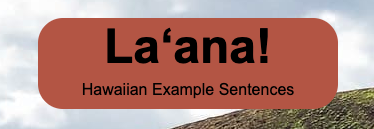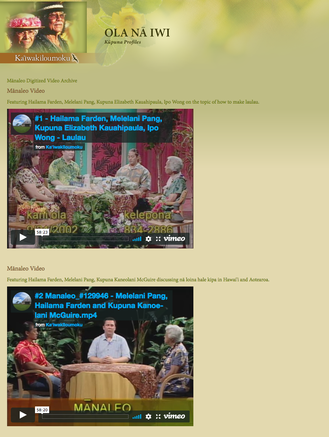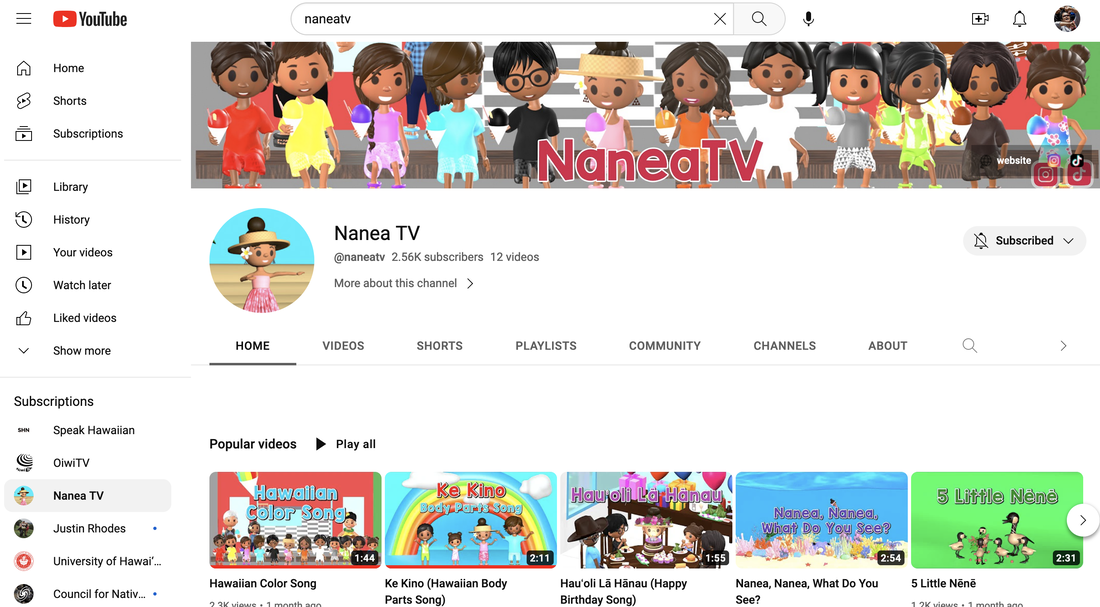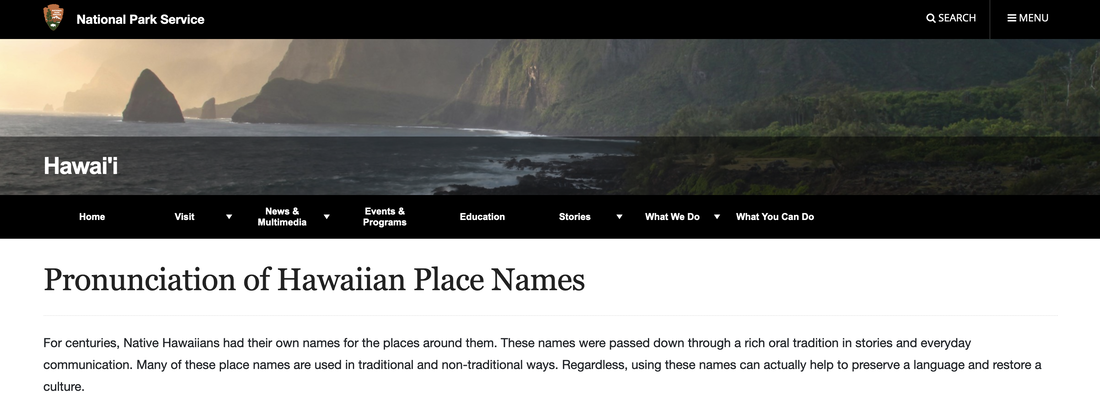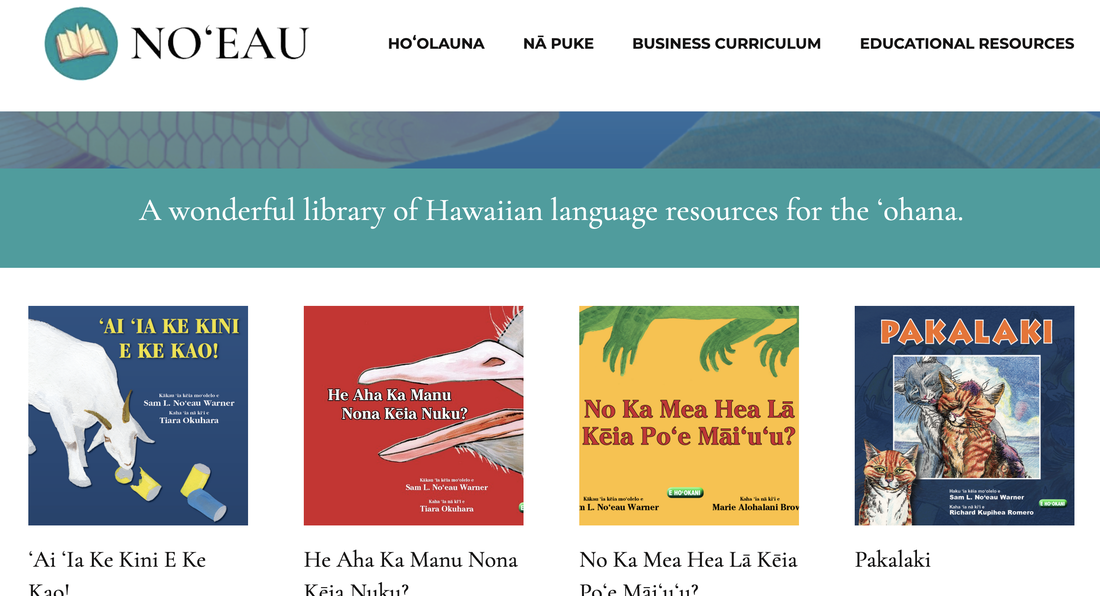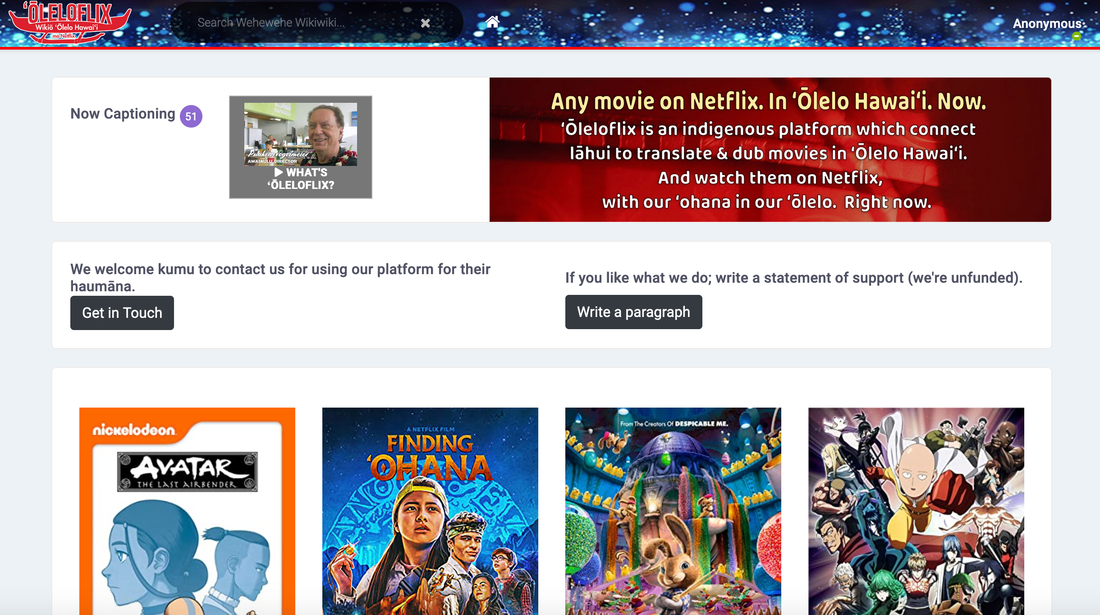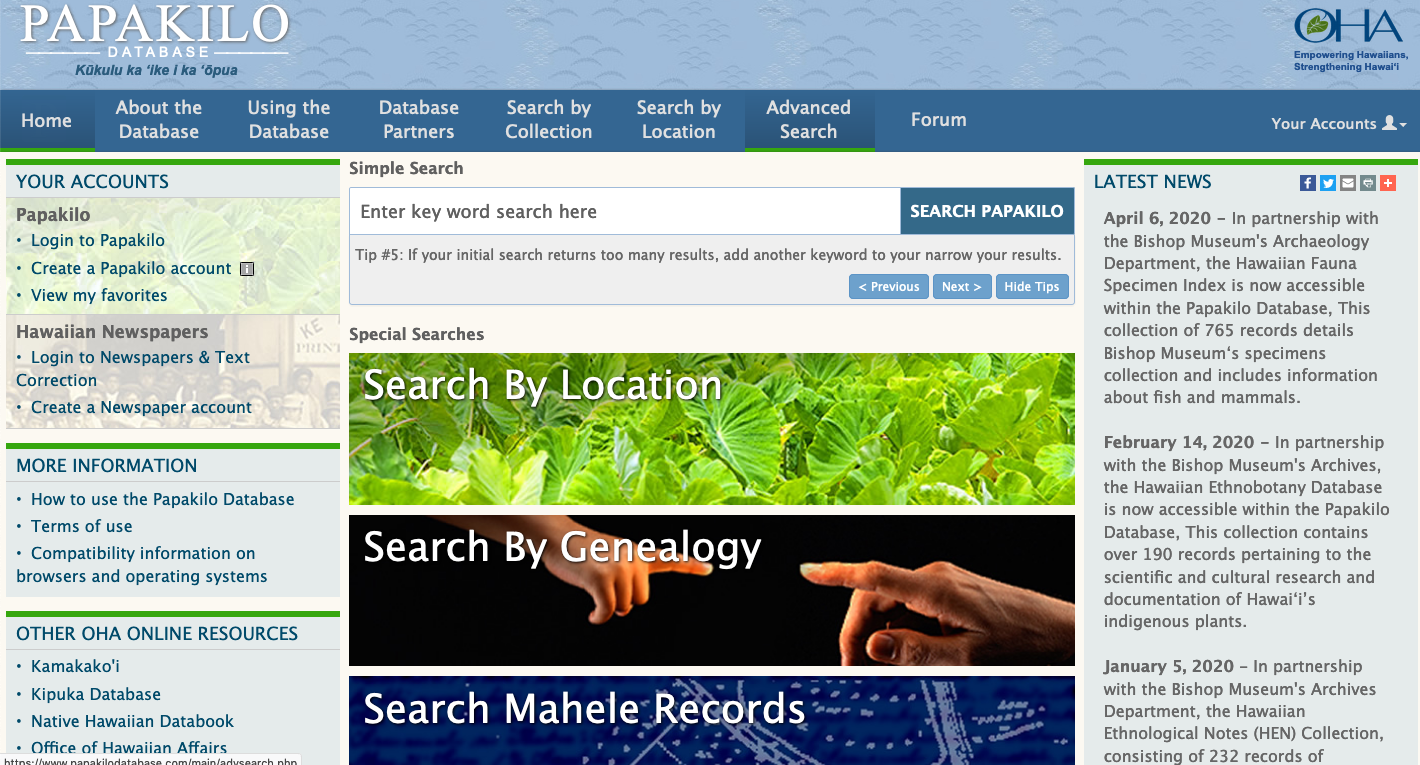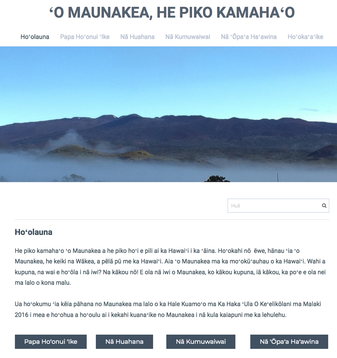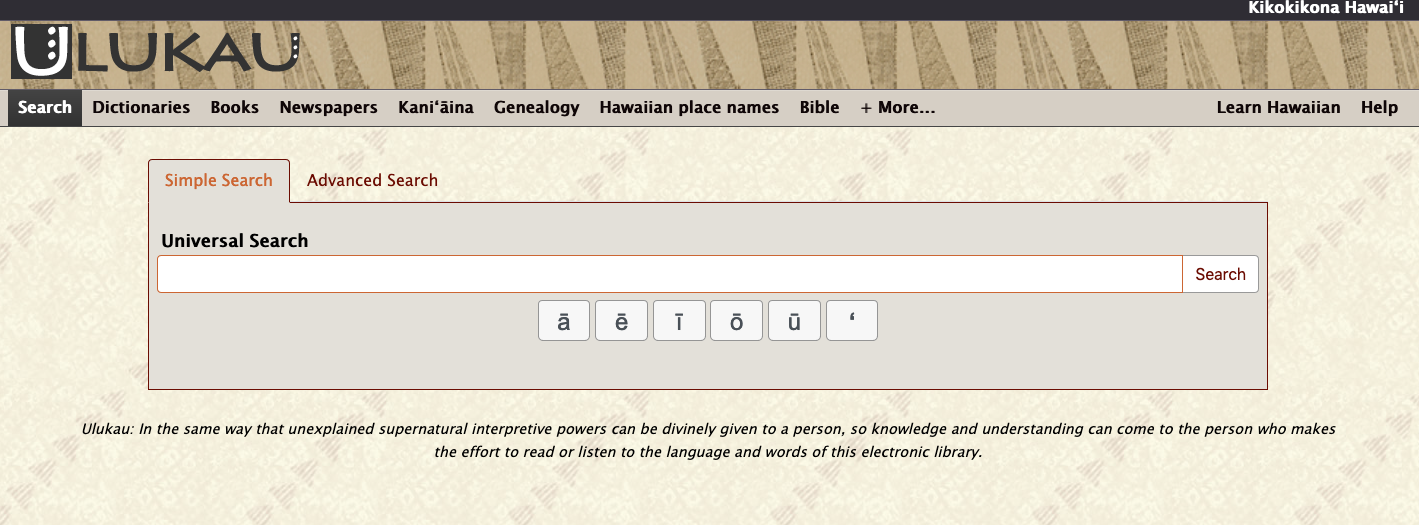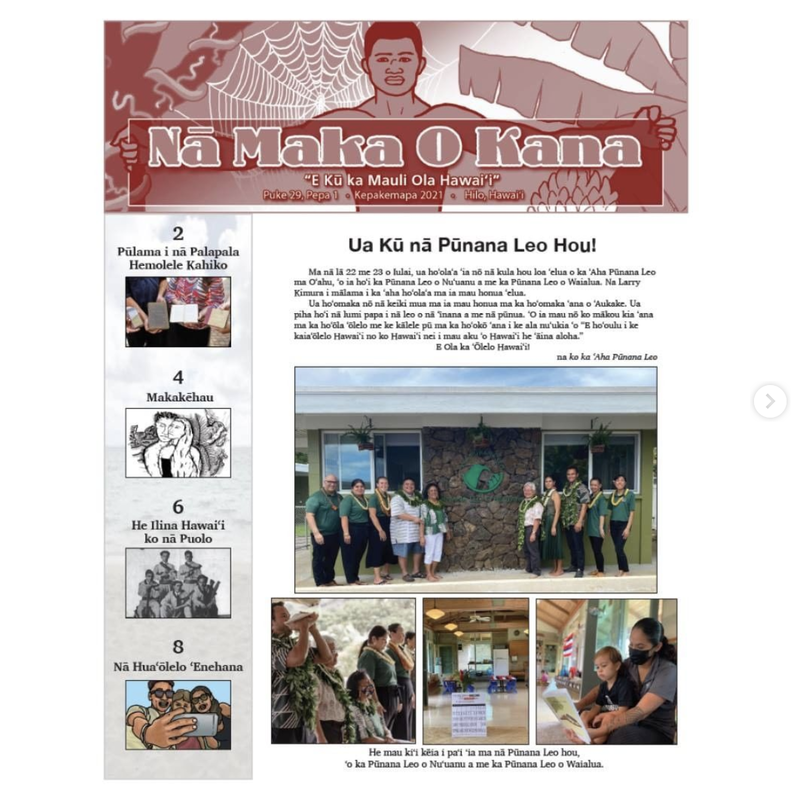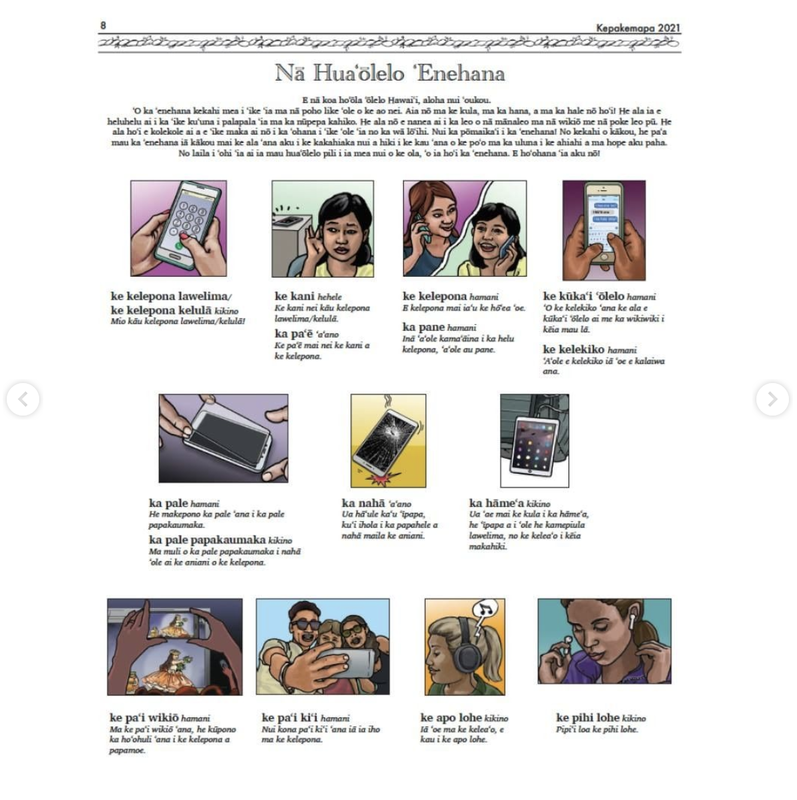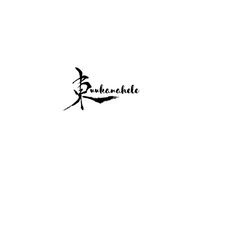|
Clinton Kanahele Collection
https://library.byuh.edu/library/archives/kanahele Clinton Kanahele (1902-1979), with the assistance of William Sproat, interviewed twenty individuals whose exceptional knowledge of Hawaiian language, history, and culture would prove valuable to future generations and help to “preserve the Hawaiian language.” |
|
E Hoʻoulu Lāhui
Hawaiian Studies & Language University of Hawaiʻi Maui College http://ehooululahui.maui.hawaii.edu/?page_id=354 Experience moʻolelo in a different way as well known voices in the Hawaiian community read these stories aloud. Visit E Hoʻoulu Lāhui's YouTube channel! |
|
Hawaiian Grammar
https://hawaiian-grammar.org/reference/?utm_source=mailpoet&utm_medium=email&utm_campaign=he-papa-kuhikuhi-pilina-olelo-1-5 This grammar of the Hawaiian language is primarily intended for the English-speaking student at an institute of higher learning. It provides a quick reference to most grammatical constructs that an undergraduate student of the Hawaiian language will encounter, while also offering examples and further discussion of many topics. The project to create the book was born of the experience of the authors in studying Hawaiian Language years one through four at the University of Hawaii Maui College and the University of Hawaii at Mānoa. A reference grammar of this type would have come to great use! |
|
Hua Maka
https://www.youtube.com/playlist?list=PLyYj2ttlAHwvt0pzwSEmefZd5kNVvY4I1 Students, faculty, staff and community members are invited to experience Hua Maka, the new weekly video series by University of Hawaiʻi at Hilo students designed to give viewers an immersive approach to learning ʻōlelo Hawaiʻi, or the Hawaiian language, using common Hawaiian words and place names found in Hilo and Hawaiʻi Island. Quick, digestible lessons in Hawaiian language are being offered through the Ka Haka ʻUla O Keʻelikōlani, College of Hawaiian Language (KHʻUOK) |
|
I Ola Hāloa
https://www.youtube.com/channel/UCYR8yrHBlGvjqrHW9KduDzw/about Welina! Welcome to the Hawaiʻi Community College I Ola Hāloa Center for Hawaiʻi Life Styles youtube channel. |
|
Ka Leo Hawaiʻi Radio Program
https://evols.library.manoa.hawaii.edu/handle/10524/47856 In 1972 the radio program Ka Leo Hawaiʻi (The Hawaiian Voice), was broadcast on KCCN-AM ... Ka Leo Hawaiʻi was a general interest talk show consisting of interviews with native speakers. Larry Kimura, one of the program’s founders, describes the show as an effort to “help and support Hawaiian language students to get their ears used to hearing the Hawaiian language.” In 1991, the show was revived, again as a weekly one-hour program, this time hosted by interviewers Puakea Nogelmeier, Tuti Kanahele, and Hauʻoli Akaka. |
|
Ka Leo O Ka Lāhui
https://www.youtube.com/user/KaukaPopaipai/featured Aloha mai e ka lāhui. I launched a YouTube channel on January 1, 2020 called "Ka Leo o ka Lāhui." It's a simple concept with the objective of getting more Hawaiian language content on the internet through interviews of interesting people who ʻōlelo Hawaiʻi. I was inspired by the Maori language series Waka Huia, very professionally done videos of various Maori speakers. While mine are amateur (just me and my iPhone), it does provide language content and will get better over time. Because most of people's 'ōlelo learning experiences have been in traditional western-style classrooms there is a culture of critique in the Hawaiian language community - "ʻAʻole pololei kēnā ʻōlelo. E hoʻopololei." I want these videos to be outside that culture, perhaps a bit of a pushback. While maintaining quality language is important, there are also great benefits to having people feel comfortable just trying to ʻōlelo freely. I think the people I interview are very interesting and each has a different story to tell. E ola ka ʻōlelo Hawaiʻi! E ola ka lāhui Hawaiʻi! |
|
Kamehameha Schools
https://www.ksbe.edu/article/ks-creates-dynamic-new-hawaiian-language-gifs The Kamehameha Schools Communications and Hawaiian Language Advancement teams collaborated to create more than 20 new ‘ōlelo Hawai‘i GIFs and stickers to help users express themselves online, just in time for Mahina ‘Ōlelo Hawai‘i – Hawaiian Language Month. The dynamic images add to the more than 50 ‘ōlelo Hawai‘i GIFs created by the team in 2022. |
|
Kanaeokana
http://kanaeokana.net/olelo It is never too late to connect to the Hawaiian language. It is the language of this ʻāina, and if you have aloha for this land, learning its language is a powerful way to express that aloha. There is no better time than now to learn, and there have never been more resources readily available. Whether you are just learning how to respond to “pehea ʻoe?” or kahe walewaha aku ka ʻōlelo ma ke alelo, there is something for everyone. |
|
Kaniʻāina
http://ulukau.org/kaniaina/cgi-bin/kaniaina?l=haw Kaniʻāina, “Voices of the Land,” is an educational resource focusing on Native Hawaiian speech aimed at documentation and preservation of Hawaiian and seeks to encourage and enhance the learning and use of Hawaiian. As a growing digital corpus of Native Hawaiian speech, Kaniʻāina provides interactive access to Native Hawaiian speech and transcripts through a bilingual digital library interface. |
|
Ka Ulana Pilina
https://www.civilbeat.org/projects/ka-ulana-pilina/ Honolulu Civil Beat's collection of news stories and opinion pieces written in ʻŌlelo Hawaiʻi |
|
Ka Ulu Hoi
http://kauluhoi.org/ He nūpepa ʻōlelo Hawaiʻi i hoʻomaka ʻia e nā haumāna o ke kulanui o Hawaiʻi i Mānoa i nā makahiki 1970, a i hoʻōla hou ʻia e ka hanauna nei. |
|
Ka ʻUmeke Kāʻeo
https://www.youtube.com/channel/UCQqg63CKHvSNipUlnATys8Q Hawaiian language Pō Mahina videos produced by Ka ʻUmeke Kāʻeo Public Charter School. |
|
Kū -A-Kanaka
https://www.kuakanaka.com/copy-of-events We are a family-owned native Hawaiian social enterprise, providing quality products and services. |
|
Kūkulu Kumuhana
https://sites.google.com/hawaii.edu/kukulu-kumuhana-english/books The Kūkulu Kumuhana Project focuses on strengthening the reading skills and aloha ʻāina insights of children in grades K-3 ... With magnetic attraction, Aloha ʻĀina constantly pulls a person back to their homeland, beloved community, and native language. Ua Kūkulu ʻia ke Kumuhana: He Ala ʻOnipaʻa i ka Meheu |
|
Kulāiwi
http://ksdl.ksbe.edu/hawaiian_resources/kulaiwi Kulāiwi is [Kamehameha Schools Distance Learning's] most-requested resource, and for good reason: these online lessons offer a free, comprehensive guide on learning Hawaiian language. These lessons are an archived program hosted by ‘Ekela Kanī‘aupi‘o Crozier. |
|
Laʻana
https://laana.org/ Laʻana is a tool for learners of Hawaiian to search example sentences ... This is useful for things like adding sentences to flashcards, or just seeing more context to better understand a word. |
|
Mānaleo
https://apps.ksbe.edu/kaiwakiloumoku/m%C4%81naleo_archive Mānaleo is a part of Kamehameha Schools' Kaʻiwakīloumoku Hawaiian Cultural Center. These videos provide opportunities for families to pay tribute to their own beloved elders and to honor these hulu kūpuna throughout the global community. |
|
National Park Service
https://www.nps.gov/locations/hawaii/pronunciation-of-place-names.htm For centuries, Native Hawaiians had their own names for the places around them. These names were passed down through a rich oral tradition in stories and everyday communication. Many of these place names are used in traditional and non-traditional ways. Regardless, using these names can actually help to preserve a language and restore a culture. |
|
ʻŌleloflix
https://oleloflix.com/#/ ʻŌleloflix is an indigenous platform which connect lāhui to translate & dub movies in ʻōlelo Hawaiʻi. And watch them on Netflix, with our ʻohana in our ʻōlelo. Right now. |
|
Papakilo Database
https://www.papakilodatabase.com/ The Office of Hawaiian Affairs’ (OHA’s) Papakilo Database, is the ongoing development of a cutting edge and comprehensive “Database of Databases” consisting of varied collections of data pertaining to historically and culturally significant places, events, and documents in Hawai'i’s history. This online repository of data will greatly increase OHA’s ability to preserve and perpetuate cultural and historical information and practices, thus providing an invaluable resource to educate other regulatory agencies, OHA’s Native Hawaiian beneficiaries, and the general public. |
|
ʻO Maunakea He Piko Kamahaʻo
http://nomaunakea.weebly.com/ Ua hoʻokumu ʻia kēia pāhana no Maunakea ma lalo o ka Hale Kuamoʻo ma Ka Haka ʻUla O Keʻelikōlani ma Malaki 2016 i mea e hoʻohua a hoʻoulu ai i kekahi kuanaʻike no Maunakea i nā kula kaiapuni me ka lehulehu. |
|
Ulukau
https://ulukau.org/ The purpose of Ulukau, the Hawaiian Electronic Library, is to make resources available for the use, teaching, and revitalization of the Hawaiian language and for a broader and deeper understanding of Hawaiʻi. |
